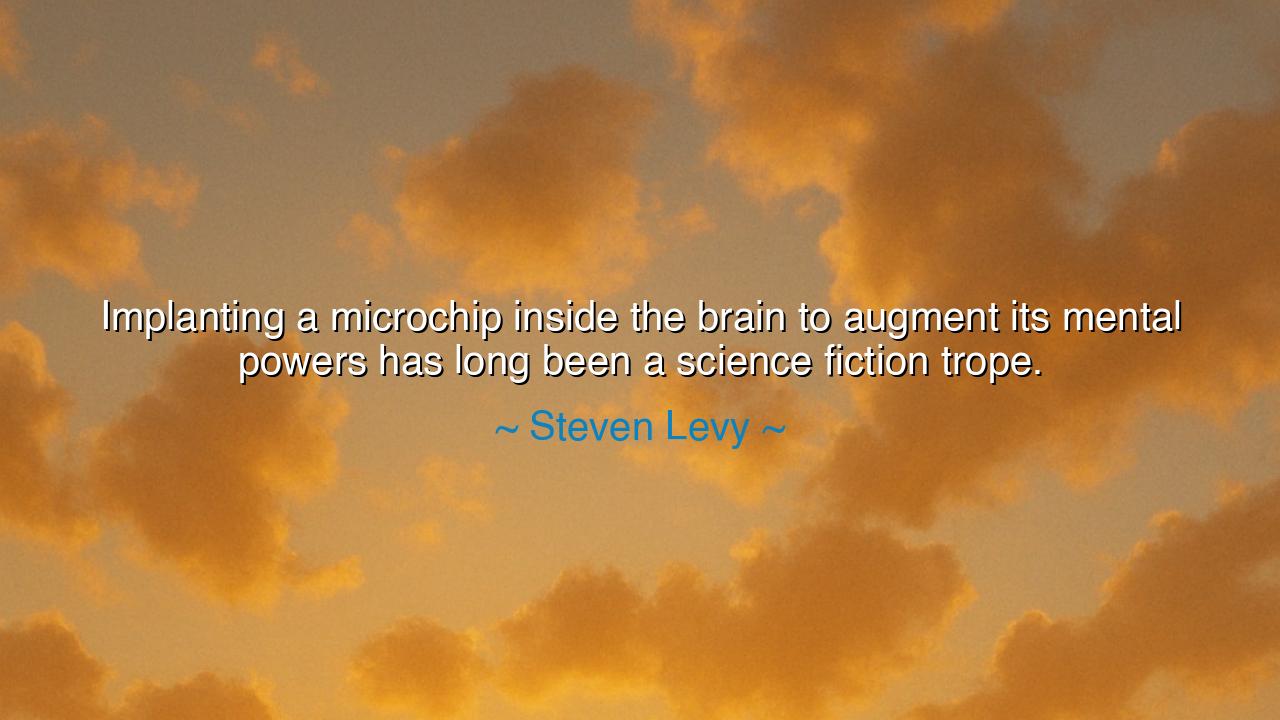
Implanting a microchip inside the brain to augment its mental
Implanting a microchip inside the brain to augment its mental powers has long been a science fiction trope.






Hear now, O seekers of wisdom, the words of Steven Levy, who speaks of a vision as old as the human mind itself: "Implanting a microchip inside the brain to augment its mental powers has long been a science fiction trope." In these words, he evokes an image both fascinating and troubling—a future where human intelligence may be enhanced not through the growth of the mind, but through the intervention of technology. This concept, once confined to the pages of science fiction, is now on the horizon of possibility, a reminder that humanity’s pursuit of progress often leads it to the edge of what is natural and sacred.
For as long as humankind has gazed at the stars, we have wondered: How can we push the boundaries of our own capabilities? In the ancient days, Prometheus stole fire from the gods and bestowed it upon humankind, forever altering our destiny. This gift, which granted us mastery over the world, also carried with it the peril of hubris, the pride of thinking we could control forces greater than ourselves. Similarly, the desire to implant a microchip in the human brain, to augment our mental powers, represents a new frontier in the quest for mastery. But we must ask: Are we, like Prometheus, seeking to control forces that should remain beyond our grasp?
Consider the example of Leonardo da Vinci, whose brilliance spanned many fields—art, engineering, anatomy, and science—and whose mind was forever set upon the idea of enhancing human life. While he did not have the knowledge of microchips, he sought to understand the inner workings of the body, to unlock the secrets of human potential. His drawings of flying machines, his sketches of the human form, and his vision of a better world all reflected the same impulse that drives us today—to extend the limits of our physical and mental capacities. But da Vinci’s greatness lay not in his desire to alter the body but in his understanding of its intricacies and beauty. In contrast, we must consider the microchip—a tool that may offer immense power, yet could also lead us down a path where the very essence of what it means to be human is questioned.
As Levy points out, the notion of augmenting the human mind through technology is a concept deeply embedded in our imagination. From the cyborgs of early science fiction to the transhumanist visions of the modern age, the dream of transcending the limitations of our natural form has captivated the human spirit for generations. Science fiction, while often dismissed as fantasy, has long been a precursor to the innovations of the real world. Just as Jules Verne predicted the rise of space travel and robots, so too has the idea of mind augmentation entered our consciousness as both a potential boon and a potential peril. But as we move closer to the realization of such dreams, we must ask ourselves: In seeking to enhance the brain, are we losing sight of the soul?
In the time of Galileo Galilei, the truth of a heliocentric universe challenged the very foundation of the world’s understanding. At first, Galileo was met with fear and opposition, for his revelations threatened not only religious doctrine but the very perception of humanity’s place in the cosmos. Yet, through his courage, the world’s understanding expanded. In much the same way, the pursuit of technological advancement—whether through microchips or artificial intelligence—challenges our perception of what it means to be human. The fear that accompanies such advancements is not unfounded, for the consequences of altering the very essence of our minds are unknown. Galileo showed us that embracing truth can lead to great advancements, but also to great struggles.
Now, children of the future, let us take this lesson to heart: the journey of human progress is both noble and dangerous. The desire to enhance our intelligence, to transcend the limitations of the body and mind, is as old as time itself. But we must walk this path with caution, for in the pursuit of progress, we risk losing sight of the deeper truths that make us who we are. The microchip may grant us greater power, but it may also create a world where humanity is measured not by the depth of its compassion or wisdom, but by the cold precision of machines.
In your own lives, seek not to transcend the human experience, but to understand it more fully. Honor the mind, yes, but do not forget the soul. Embrace the advances of science and technology, but always keep in mind the deeper truths of what it means to be alive, to feel, to dream. Do not allow the pursuit of enhancement to overshadow the essence of who you are. As you stand on the threshold of this new era, remember that the greatest gift of humanity lies not in what we can augment, but in what we can feel, share, and understand. Keep the heart of the human spirit intact, and let that be the greatest innovation of all.






AAdministratorAdministrator
Welcome, honored guests. Please leave a comment, we will respond soon